|
|
|
 |
|
 |
back |
The Cheshire Cat Blog
 |
 |
December 2010 |
 |
| |
 |
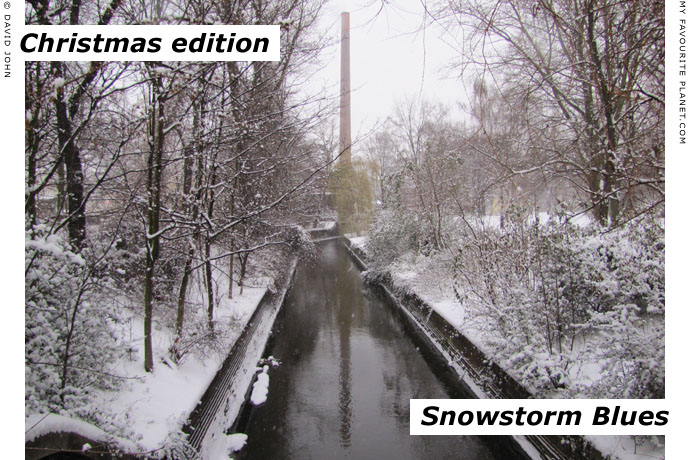 |
December 2010 in northern Europe began with record snowfall and low temperatures leading to
transport disruption, road accidents, flooding and several other kinds of winter misery. Those
who thought they could escape the Big Freeze by sneaking off to warmer climes were in for a
rude awakening: the Spanish air-traffic controllers decided to add to the fun by going on strike.
Oh well, only three more months or so of this to go ...
To cheer us all up, The Cheshire Cat thought you might like a jolly wintertime
song to sing along to while huddled around the toaster. Happy holidays. |
| |

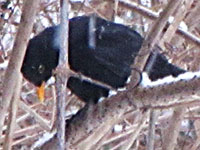
Not a blues fan?
Get on down to the rest of the blog |
* You can replace "Berlin" with the name of your own hibernating hometown or favourite frostbitten favela (Paris, Chicago, Hoboken, Llanfairpwllgwyngyllgogerychwyrndrobwll-
llantysiliogogogoch, Hódmezövásárhely, Scunthorpe, etc.). |
Snowstorm Blues
by Deaf Pomegranate Washington
Lyrics courtesy of Fatchance Music Corp. ©
I woke up this mornin'
icicles all over my bed
Lord, I woke up this mornin'
snowstorm blowin in my head
well its winter in Berlin *
and my heating's dying, died, dead
I need some water for my coffee
but the pipes they all done froze
merde, I'd kill for a Gauloise
the pack's déjà empty I suppose
look out my frosted window
man, how I envy those crows
It seems like I got the snowstorm blues
sure feels like I got the snowstorm blues
wish I could fly south now
like a duck, a swallow or a goose
Outside it's blowin a blizzard
and snow's blockin my front door
better get my Sears & Roebuck shovel
and do the Sisyphus shuffle one time more
Dig a trench out to the mailbox
in my coat, my boots and hat
with a blowtorch and a chisel
why whatcha make of that?
when I get finished here, Lord,
gotta go defrost that cat
Could it be I'm sufferin' from the snowstorm blues?
outta breath deep within the snowstorm blues
wanna be flying south now
don't know which way to choose
She sent me a postcard
said that she was doing just fine
she wrote me this postcard
"dear John" hid 'tween every line
with a picture of Havana
palm trees, blue skies and sunshine, sunshine, sunshine
Now I know I got the snowstorm blues
ooh, for sure it's those snowstorm blues
wish I could fly south now
but I gotta stay and pay my wintry dues
Gotta get to work now
eight-thirty sharp without fail
but the trains are all out now
with not a bus or cab to hail
and the factory's closed down now
boss says cheque is in the mail
(I don't rightly believe him somehow)
So I go over to Jim's place
best buddies stick fast like glue
guess I'll slide over to Jim's place
he always knows just what to do
(That's Jim for you)
but a note on his door says
"I'll be back real soon.
I've had it with these snowstorms,
icicles, frostbite, grey skies and gloom.
I'm headed for Havana, boy,
see ya when the tulips bloom."
Don't you know, I got me a real bad case of them snowstorm blues
ooh Lord, can't you save me from those mean old hell freezes over,
frozen and sober, time to move over, this ain't no roll in clover
snowstorm blues
wish I could fly south now
to Florida, Guatemala, Capetown or Toulouse
(someplace real warm, tropical even, relaxin, you know,
get some sand between your poor old frozen toes,
go snorkling in that there azure ocean, wear a Panama hat
and a real sharp Hawaiiiiian shirt, check out some
coconuts and pineapples,
drink a pina collada under a grass-mat sunshade,
dance to some scratchy rock-n-roll records 'neath the mantle of the moon...)
You and me baby, always heaven-bent
you said you'd stick with me, baby,
whichever way things went
but you flew out on me Monday
must be your winter of discontent
Yeah, I wish I could fly south now
but I'm stuck here without a clue
I said, I'd love to fly south now
but I'm stuck here without you
Now I got the blues
they call them the snowstorm blues
I'm snowblind and I'm loveblind, baby,
I'm frozen in these snowstorm blues
Diddle-dee diddle-dee diddle-dee dong,
dong doooooooooooong. |
|
| |
 |
| |
| |
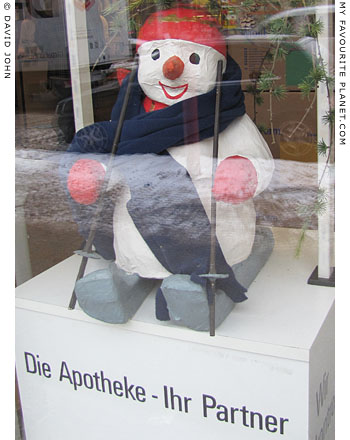 |

Every snowcloud
has a silver lining
"Die Apotheke - Ihr Partner"
(the pharmacist - your partner)
|
Winter is not so gloomy for everyone, of course. Suppliers of electricity, gas and heating fuels rub their hands in glee as temperatures plummet, to say nothing of purveyors of thermal underwear, woolly gloves and socks. And remember, it's nearly always wintry somewhere on the planet.
A grand time pharmacists have of it too, jingling the festive cash registers merrily for queues of customers (or partners? But in what, exactly?) in need of headache pills, cold cures, nasal sprays, chest rubs, lip balms, chillblain creams, vitamin supplements and balsamized tissues. Bless you, bless you, bless you, one and all.
German apothecaries are particularly priviliged, their trade is protected by various laws and they have a powerful lobby. In contrast to other European countries, in Germany even aspirins can only be sold by a registered pharmacist.
In Britain, practitioners of this venerable and lucrative trade used to be known as chemists. But on the sceptred isle ye olde chemist's shop has become an endangered species: it seems that this title is now considered hopelessly old-fashioned and outre; the American appellation pharmacy is most definitely preferred.
In Wim Wender's film (movie) Kings of the Road, one of the characters declared: "the Americans have colonized our sub-conscious". Now they've colonized the Great British Dyspepsia too. Have a nice day, and please call again. |
|
Pharmacy shop display, Wedding, Berlin, Germany.
Photo: © David John |
|
|
 |
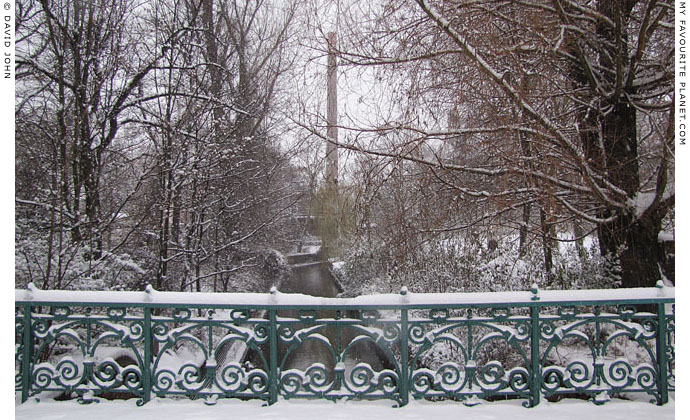 |
| |
Snow on the Panke
Schönstedtstrassenbrücke across the Panke, Wedding, Berlin, Germany.
Built in 1906, it is one of over 120 bridges crossing the Panke along its
29 kilometre course, 20.2 km of which is within Berlin. The chimney was part
of the old bus maintenance works, now tranformed into an artists' centre.
|
The Panke is a river which flows south-westwards through the Berlin districts of Pankow and Mitte. A hundred years ago it was still navigable by small boats, but since it was canalized to prevent flooding it rarely reaches more than a metre in depth. Thankfully, during the greatest period of Berlin's growth - the building boom during the 19th and early 20th centuries - the Panke's boggy banks were considered unsuitable for building, so that today for much its length the stream is lined by green areas, parks and public footpaths. Walking and cycling along the Panke is a popular pastime for Berliners. The area around the stream is surprisingly rich in birdlife, including ducks, blackbirds, tits, crows, magpies, sparrows, swallows, swifts, finches, woodpeckers and the occasional heron. I have also seen squirrels, foxes and a marten scurrying about here. Apparently, "Das Paradies liegt an der Panke" (Paradise lies on the Panke) is an old Berliner saying, and although I've never heard anybody saying it myself, there are days and evenings when you could almost believe it. Almost.
From its source north of Berlin the Panke passes through the suburban gardens of Pankow (formerly in East Berlin) which, although only 20 minutes by underground from Berlin's city centre, still retains some of the historic charms of a small town. At its end the stream is surrounded by a Victorian industrial landscape of old red-brick factories which are inevitably giving way to modern high-rise apartment and office blocks and new government buildings; there is now even a helicopter pad for politicians in a hurry. At Nordhafen (North Harbour) the Panke finally flows into the Berlin-Spandauer Canal which itself joins the River Spree a little further south. Until World War 2 this manmade confluence was part of a busy industrial waterway carrying components, goods and fuel to and from local harbours, factories and warehouses. The inevitable pollution inspired the locals to dub the river "Stinke-Panke".
During the Cold War it became part of the iron curtain border between East and West Berlin. A section of the Berlin Wall and an East German watch tower * can still be seen here as well as the 18th century Prussian military cemetery Invalidenfriedhof.
In the last few years estate agents have attempted to make the old working class area of Wedding around the Panke seem more attractive to home-hunters by advertising it as the "Panketal" (Panke Valley) **, which makes it sound like some Alpine idyll. It's probably only a matter of time before somebody starts classes in "Yodelling for Yuppies". Remember, you heard it here first.
* The Kieler Eck watchtower is one of the last 3 remaining of 302 DDR observation posts along the 155 kilometre "innerdeutschen Grenze" (Inner German Border a.k.a. the Anti-Fascist Wall) which separated East and West Berlin from 1961 to 1989.
** Panketal is actually the name of a municipality 15 km northeast of Berlin.
Photo: © David John |
 |
|
 |
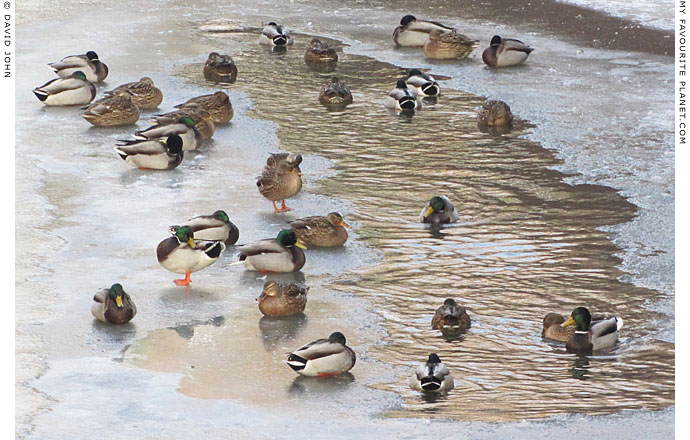 |
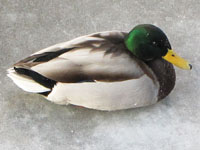 |
|
|
The ducks are alright
An eiderdown of ducks meet for a communal bath on the frozen
Panke. They seem quite happy sitting on the ice and swimming
in the freeze-your-nadgers-off water. How DO they do it?
Ducks on the Panke, Wedding, Berlin. Photo: © David John |
 |
|
| |
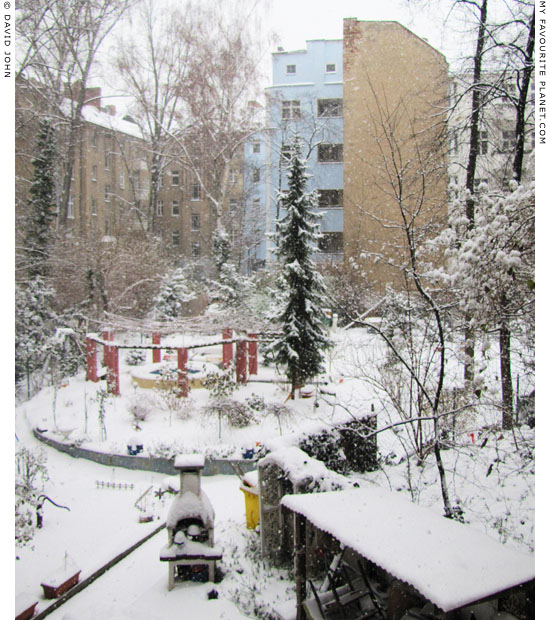 |
| |
Not in my back yard
Just a few months ago this garden, unusually large for this part of Berlin,
was full of people enjoying a warm summer evening, eating, drinking
and watching the soccer World Cup on an improvised projector screen.
Needless to say, today's barbecue party has been cancelled.
"Panketal", Wedding, Berlin, Germany. Photo: © David John |
 |
|
| |
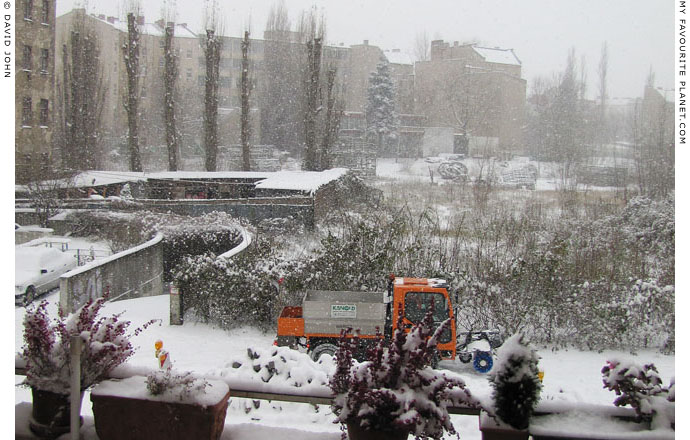 |
| |
A complete waste of time
A council snowplough in action, Wedding, Berlin, Germany.
|
Everlastingly laborious
In Greek mythology, Sisuphos (Sisyphus) was the founder and king of Ephyra (later Corinth) who offended the gods, allegedly. For his impiety he was condemned to Hades and commanded to push a huge stone up a hill. Every time he got the boulder to the top it rolled down again, and he was forced to endlessly repeat his labours.
The terms "labour of Sisyphus" and "Sisyphean task", signifying a never-ending chore, are rarely used in English today, but every German speaker knows what "Sisyphusarbeit" means: no end of work.
The Germans were once renowned for their dedication to hard work, efficiency and order. Other countries especially envied their ability to keep the roads and railway tracks free of snow with salt, sand, shiny snowploughs and the shovels and sweat of armies of workers. This was a good source of seasonal income for students and the unemployed, and ordinary citizens pitched in with their own unpaid elbow-grease and even the ashes from their heating stoves.
"Those days have gone forever, over along time ago."
Nobody seems to bother any more. A political storm in a snowshoe broke out during and after the winter of 2009-2010 when huge piles of frozen snow lay on Berlin's streets from November until March. Council cleaners were conspicuous by their absence and many public rubbish bins also remained unemptied for months. Getting around the city was difficult for motorists but a nightmare for pedestrians, especially as the snow became filthy slush which froze to deadly ice when the temperature dropped. The railways also failed to cope with the strange white stuff falling from heaven, causing perpetual misery for passengers, or "Fahrgäste" (travel guests) as they have now euphemistically become known.
Just to make things more interesting, the Berlin water authority finally decided to start a large project to replace aged, leaky water mains pipes and dug up several streets in preparation. Unfortunately, they left this until the end of October, shortly before the inevitable, predictable first snows fell on the city. The freshly-dug trenches were just left abandoned until the next spring, which brought just that extra dash of chaos and misery for motorists and pedestrians alike.
When the snow finally thawed in March, the stink was appalling as tons of dog turds, rotting garbage, broken glass and even fizzy wine bottles and used fireworks (left over from New Year's Eve celebrations) lay around. Local authorities and politicians tried to shift the blame onto private contractors and even house-owners, and threatened to prosecute just about everybody in town.
The fuss seemed to have all blown over and away with the snow and the stink. But now, incredible as it may seem, winter has returned. Who would have expected such a thing? Well, not the local authorities or the railways, that's for sure.
The photo above shows one of the small orange vehicles which appear now and again and push a bit of snow off the pavement (sidewalk, Bürgersteig) in the direction of the kerb. The two main effects of this are: 1) a centimetre or so of snow remains, compressed by the snowplough then further trampled down by pedestrians, causing a frozen mass which becomes dangerous to walk on; 2) the piled-up snow along the kerb, which quickly becomes filthy with unswept street rubbish and oily muck from motor vehicles, makes it even more difficult to squeeze between parked cars and trucks when attempting to cross the street. (Mind you, it can get worse in other cities such as New York, where walls of scummy snow are sometimes piled over a metre high along kerbs. It gets like trench warfare out there.)
In other words, such a pathetic show at clearing and cleaning the streets is a complete waste of time, resources and money. Even worse it is dangerous, as more fresh snow falls on the old compressed stuff, many people can not see the peril of the slippery substrata. By February you stop counting the number of old ladies you see taking a fall, and if you manage to survive a winter without a bruised behind and injured pride you count yourself extremely fortunate. The politicians and bureacrats may claim to be making an effort, but a lot of people don't think they they are really bothered; after all, winter has not yet become an electoral issue here.
It is also worth noting that this year the German government seem to have put a lot of propaganda effort into warning motorists of the penalties for not fitting winter tyres to their vehicles whilst totally ignoring assertions by tyre manufacturers and suppliers that they have almost no stocks available. Go figure.
Photo: © David John |
 |
|
| |
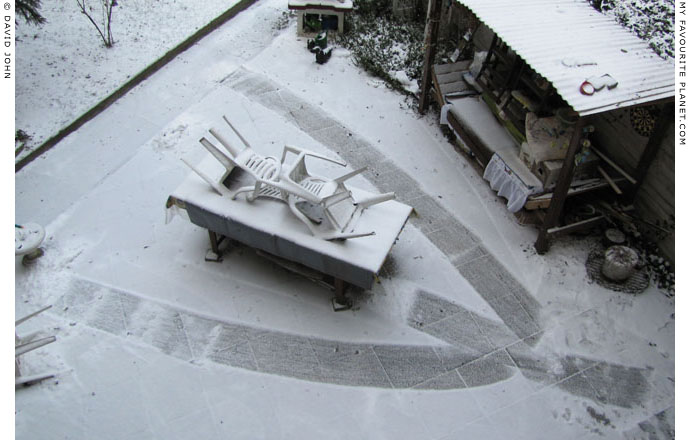 |
| |
Yes, but is it art?
Even backyard snow-sweepers get the blues. I hope somebody has put the kettle on.
"Panketal", Wedding, Berlin, Germany. Photo: © David John |
 |
|
| |
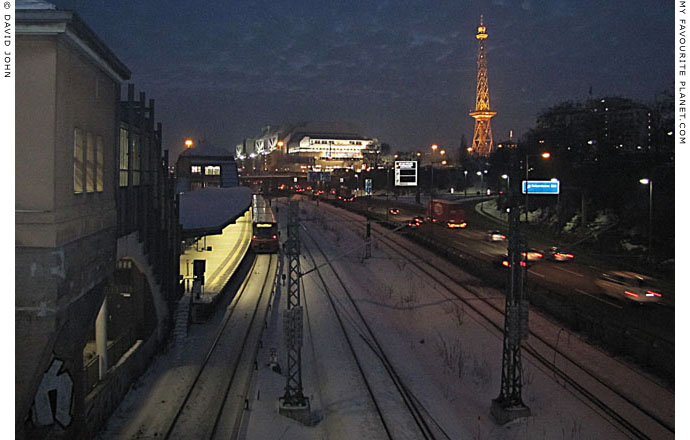 |
| |
Heading west
Somehow, somewhen, the snow-clearing crews get on top of the problem and the traffic
and trains start rolling again. Time for commuters to head home, each to his own suburb.
The International Congress Centre (ICC) and Funkturm (Radio tower),
Charlottenberg, Berlin, Germany.
Photo: © David John |
 |
|
| |
| |
|
| |
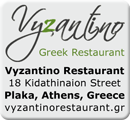 |
| |
 |
| |
 |
| |
 |
| |
 |
| |
 |
| |
George Alvanos
rooms
in Kavala's historic Panagia District
Anthemiou 35,
Kavala, Greece
kavalarooms.gr |
| |
| |
Olive Garden Restaurant
Kastellorizo,
Greece +30 22460 49 109
kastellorizo.de |
| |
| |
Papoutsis
Travel Agency
Kastellorizo,
Greece +30 22460 49 286
greeklodgings.gr |
| |
| |
|